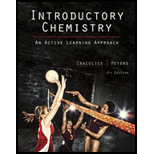
Concept explainers
Write the electronic configuration for the ions of the third period element that form monoatomic ions that are isoelectronic with a noble gas atom. Also, identify the noble gas atoms having those configurations.
Interpretation:
The electronic configuration for the ions of the third period element that form monoatomic ions that are iso-electronic with a noble gas atom is to be stated. The noble gas atoms having those configurations are to be identified.
Concept introduction:
The arrangement of electrons in the energy sublevels is explained by the electron configuration of an atom. The electron configuration of an atom can be written according to the arrangement of energy levels as shown below.
In the modern periodic table, the horizontal rows are known as periods, whereas vertical columns are known as groups. There are
Answer to Problem 1E
The electronic configuration of
Explanation of Solution
An iso-electronic series is a group of ions that contain the same number of electrons.
The elements in the third period are
The atomic number of
The electronic configuration of
The electronic configuration of
The electronic configuration of
The atomic number of
The electronic configuration of
The electronic configuration of
The electronic configuration of
The electronic configuration of
Want to see more full solutions like this?
Chapter 12 Solutions
Introductory Chemistry: An Active Learning Approach
- टे Predict the major products of this organic reaction. Be sure to use wedge and dash bonds when necessary, for example to distinguish between different major products. ☐ ☐ : ☐ + NaOH HO 2 Click and drag to start drawing a structure.arrow_forwardShown below are five NMR spectra for five different C6H10O2 compounds. For each spectrum, draw the structure of the compound, and assign the spectrum by labeling H's in your structure (or in a second drawing of the structure) with the chemical shifts of the corresponding signals (which can be estimated to nearest 0.1 ppm). IR information is also provided. As a reminder, a peak near 1700 cm-1 is consistent with the presence of a carbonyl (C=O), and a peak near 3300 cm-1 is consistent with the presence of an O–H. Extra information: For C6H10O2 , there must be either 2 double bonds, or 1 triple bond, or two rings to account for the unsaturation. There is no two rings for this problem. A strong band was observed in the IR at 1717 cm-1arrow_forwardPredict the major products of the organic reaction below. : ☐ + Х ك OH 1. NaH 2. CH₂Br Click and drag to start drawing a structure.arrow_forward
- NG NC 15Show all the steps you would use to synthesize the following products shown below using benzene and any organic reagent 4 carbons or less as your starting material in addition to any inorganic reagents that you have learned. NO 2 NC SO3H NO2 OHarrow_forwardDon't used hand raiting and don't used Ai solutionarrow_forwardShow work...don't give Ai generated solutionarrow_forward
- 1 Please provide an efficient synthesis of the product below from the starting material. Use the starting material as the ONLY source of carbon atoms. Show the synthesis of each compound that would be used in the overall synthesis of the product. [This synthesis uses alkyne and alcohol chemistry.]arrow_forward10- 4000 20 20 30- %Reflectance 60 50- 09 60- 40- Date: Thu Feb 06 17:30:02 2025 (GMT-05:0(UnknownP Scans: 8 Resolution: 2.000 70 70 88 80 3500 3000 2500 90 100 00 Wavenumbers (cm-1) 2000 1500 2983.10 2359.13 1602.52 1584.22 1451.19 1391.87 1367.07 1314.37 1174.34 1070.13 1027.33 1714.16 1269.47 1000 1106.08 1001.14 937.02 873.60 850.20 780.22 686.91 674.38 643.09 617.98 02/06/25 16:38:20arrow_forwardd. Draw arrow-pushing mechanism for an enzymatic retro-aldol reaction of the following hexose. Use B: and/or HA as needed. OH OH سية HO OH OHarrow_forward
 General, Organic, and Biological ChemistryChemistryISBN:9781285853918Author:H. Stephen StokerPublisher:Cengage Learning
General, Organic, and Biological ChemistryChemistryISBN:9781285853918Author:H. Stephen StokerPublisher:Cengage Learning Introductory Chemistry: An Active Learning Approa...ChemistryISBN:9781305079250Author:Mark S. Cracolice, Ed PetersPublisher:Cengage Learning
Introductory Chemistry: An Active Learning Approa...ChemistryISBN:9781305079250Author:Mark S. Cracolice, Ed PetersPublisher:Cengage Learning World of Chemistry, 3rd editionChemistryISBN:9781133109655Author:Steven S. Zumdahl, Susan L. Zumdahl, Donald J. DeCostePublisher:Brooks / Cole / Cengage Learning
World of Chemistry, 3rd editionChemistryISBN:9781133109655Author:Steven S. Zumdahl, Susan L. Zumdahl, Donald J. DeCostePublisher:Brooks / Cole / Cengage Learning Chemistry for Today: General, Organic, and Bioche...ChemistryISBN:9781305960060Author:Spencer L. Seager, Michael R. Slabaugh, Maren S. HansenPublisher:Cengage Learning
Chemistry for Today: General, Organic, and Bioche...ChemistryISBN:9781305960060Author:Spencer L. Seager, Michael R. Slabaugh, Maren S. HansenPublisher:Cengage Learning Living By Chemistry: First Edition TextbookChemistryISBN:9781559539418Author:Angelica StacyPublisher:MAC HIGHER
Living By Chemistry: First Edition TextbookChemistryISBN:9781559539418Author:Angelica StacyPublisher:MAC HIGHER





